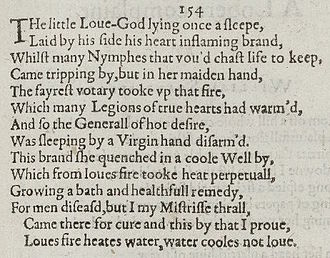Sonnet 154
Q1
Q2
Q3
C
The little Love-god lying once asleep
Laid by his side his heart-inflaming brand,
Whilst many nymphs that vow’d chaste life to keep
Came tripping by; but in her maiden hand
The fairest votary took up that fire
Which many legions of true hearts had warm’d;
And so the general of hot desire
Was sleeping by a virgin hand disarm’d.
This brand she quenched in a cool well by,
Which from Love’s fire took heat perpetual,
Growing a bath and healthful remedy
For men diseas’d; but I, my mistress’ thrall,
Came there for cure, and this by that I prove,
Love’s fire heats water, water cools not love.
4
8
12
14
As the last in the famed collection of sonnets written by English poet and playwright William Shakespeare from 1592 to 1598, Sonnet 154 is most often thought of in a pair with the previous sonnet, number 153. As A. L. Rowse states in Shakespeare's Sonnets: The Problems Solved, Sonnets 153 and 154 "are not unsuitably placed as a kind of coda to the Dark Lady Sonnets, to which they relate." Rowse calls attention to the fact that Sonnets 153 and 154 "serve quite well to round off the affair Shakespeare had with Emilia, the woman characterized as the Dark Lady, and the section of the Dark Lady sonnets". Shakespeare used Greek mythology to address love and despair in relationships. The material in Sonnets 153 and 154 has been shown to relate to the six-line epigram by the Byzantine poet known as Marianus Scholasticus, who published a collection of 3,500 poems called The Greek Anthology. When translated, the epigram resembles Sonnets 153 and 154, addressing love and the story of Cupid, the torch, and the Nymph's attempt to extinguish the torch.
Mirroring the actions in the first two quatrains of Sonnet 153, Sonnet 154 deals with an unnamed Cupid that Rowse defines as "The little god of love" who is vulnerable in sleep. The conflict arises as a group of "nymphs vowed to chastity" walk by the sleeping Cupid. The second quatrain explains that "The fairest of them took in her hand the fire that had warmed legions of hearts". This causes a conflict because the disarmer is a virgin and has stolen the powerful torch and symbol of love (Shakespeare line 8). The third quatrain introduces an even more devastating conflict as the virgin "quenched this brand in a cool well near by". The plan to destroy the symbol backfires as the well takes "perpetual heat from love's fire, becoming a medicinal bath for men diseased". The couplet resolves these conflicts as Rowse explains, "But I, my mistress' slave, came there for cure". The message is learned with the concluding line that love is a strong force and cannot be conquered: "Love's fire heats water, water cools not love."
...
Wikipedia

